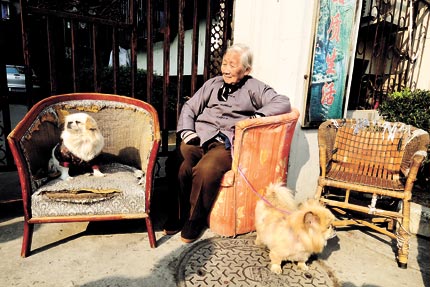
A senior resident sits in front of her home in Zhiyanzi Lane. Around 1.1 million people are over 60 years in Hangzhou.
Hangzhou is grayer and "older" than many cities - 16.5 percent of the population is over 60. Caring for seniors is a major problem, as many need help but don't want to leave home. Xu Wenwen reports.
Hangzhou is aging as residents live longer, and meeting the needs of senior citizens is an issue for the city.
Around 1.1 million people over 60 years of age represent 16.5 percent of the city population - it's one of China's "grayest" cities. In some old districts senior citizens represent more than 20 percent of the population, according to the Hangzhou Civil Affairs Bureau.
By international standards, a country or city is aging when people over 60 represent more than 10 percent of the population.
Numerous issues arise, notably care for the elderly as many wish to stay at home but have no children nearby to care for them.
The market for housekeeping and assisted living services is growing. Rest homes also are needed.
The Hangzhou municipal government has enacted policies to encourage private investment in construction of retirement homes and to support public senior homes. The city has only five privately run facilities for the elderly.
In Hangzhou's six main districts, public homes for the elderly with more than 50 beds can receive a 6,000-yuan (US$878) annual subsidy for each bed. Facilities with less than 50 beds can receive 3,000 yuan per bed.
Residential buildings that have rented or will rent out space for the elderly for more than five years are eligible for five-year subsidies: 800 yuan annually per bed for homes with more than 50 beds; 500 yuan per bed for homes with less than 50 beds.
Senior citizens prefer to live at home, even in empty nests, and many need housekeeping services but don't like strangers coming into their homes. Others try to squeeze into crowded homes for the elderly in the city center, while rest homes in the suburbs have vacancies that hurt their profitability.
Around 98 percent of the elderly live at home, while 2 percent are in facilities, the civil affairs bureau says.
Providing in-house services such as cleaning and cooking represents a large potential market, but taking care of the elderly is difficult and many people don't want the work.
Old folks commonly complain that housekeepers don't wash clothes properly or clean well, so that residents have to repeat the chores themselves. Some complain that housekeeping staff never listen to them.
"Old people prefer having their relatives care for them," says Chen Jianning, secretary general of the Hangzhou Housekeeping Association, outlining problems faced by his group. "Moreover, workers who go to their homes usually have little medical knowledge, so they may not know how to treat illness or handle emergencies."
In view of this, many housekeeping service companies are unwilling to provide day-long care and prefer to send hourly workers to do simple house cleaning, says Chen.
|


